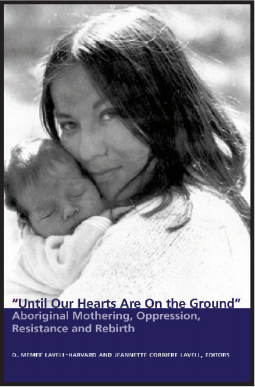
Price: $29.95
Page Count: 250
Publication Date: October 2006
ISBN: 1-55014-461-8
“This book, written by renowned authors/researchers/scholars, undisputedly proves that the survival of all Aboriginal peoples can be wholly attributed to the strength and resilience of Aboriginal women. Reading this book strengthened my belief that the customs, culture and language of Aboriginal peoples will always be safe-guarded and transmitted from generation to generation by Aboriginal women in their role as mothers, grandmothers, aunties and sisters, regardless of any adversity.”
—CLAUDETTE DUMONT-SMITH, RN, BSCN, MPA, Senior Health Advisor, Native Women‘s Association of Canada
“This collection of essays on Aboriginal Mothering draws its power from the personal memoirs and reflections of Aboriginal mothers, recounted first-hand or shared with writers and academics. The stories tell of the multiple ways that colonizing forces in North America, Australia and Africa have disrupted the practices and bonds of Aboriginal mothering. They tell also of the multiple ways that Aboriginal mothers, sisters, aunties and grandmothers are restoring and reinventing networks of kinship that nourish and define their identities. These essays demonstrate that words reclaiming memory and kinship can surely heal.”
—MARLENE BRANT CASTELLANO, Mohawk Grandmother and Professor Emerita of Trent University
SECTION ONE
EXIT FROM THE WOMB: Becoming an Aboriginal Mother
Chapter ONE:
“New Life Stirring: Mothering, Transformation and Aboriginal Womanhood”
(Kim Anderson)
CHAPTER TWO:
“Birthing an Indigenous Resurgence: Decolonizing our Pregnancy and Birthing Ceremonies.” (Leanne Simpson)
CHAPTER THREE:
“Childbirth Experiences of Women from One Mi'kmaq Community in Nova Scotia”
(Joanne Whitty-Rogers, Josephine Etowa, Joan Evans)
SECTION TWO
CONCEPTIONS AND PRACTICES OF ABORIGINAL MOTHERING
CHAPTER FOUR:
"An Anishinawbe-kwe Ideology on Mothering and Motherhood"
(Renée Elizabeth Mzinegiizhigo-kwe Bédard)
CHAPTER FIVE
"Power Mothering: The Haudenosaunee Model” (Jan Noel)
CHAPTER SIX
“Dances with Cougar: Learning from Traditional Parenting Skills Programs” (Joanne Arnott)
CHAPTER SEVEN
"Back to Basics: Mothering and Grand Mothering in the Context of Urban Ghana"
(Brenda F. McGadney-Douglass, Nana Araba Apt & Richard L. Douglass)
CHAPTER EIGHT
"Aboriginal Mothering: An Australian Perspective" (Belinda Wheeler)
SECTION THREE
‘BIG MOTHER’: THE ROLE OF THE STATE IN THE
PERFORMANCE OF MOTHERING
CHAPTER NINE
"Aboriginal Mothering Under the State's Gaze" (Randi Cull)
CHAPTER TEN
"Canada’s Indian Residential Schools and its Impacts on Mothering" (Rosalyn Ing)
CHAPTER ELEVEN
"Fostering Indigeneity : The Role of Aboriginal Mothers and Aboriginal Early Child Care in Response to Colonial Foster-Care Interventions. (Margo Greenwood & Sarah de Leeuw)
CHAPTER TWELVE
“Aboriginal Women Vs. Canada: The Struggle for our Mothers to Remain Aboriginal” (Jeanette Corbiere Lavell & Dawn Memee Harvard)
CHAPTER THIRTEEN
"They Let Their Kids Run Wild: The Policing of Aboriginal Mothering in Quebec”
(Cheryl Gosselin)
SECTION FOUR
LITERARY REPRESENTATIONS OF ABORIGINAL MOTHERING
CHAPTER FOURTEEN
"Woman Dreaming: An Exploration of the Australian Aborigine's Return to Heritage" (Debra Bruch)
CHAPTER FIFTEEN
"'Confused with the Sorrow': Aboriginal Mothering in The Antelope Wife and
Gardens in the Dunes" (Roxanne Harde)
CHAPTER SIXTEEN
"Lost Mothers and 'Stolen Generations': Representations of Family in Contemporary Aboriginal Writings" (Hilary Marion Jane Emmett)
Ms. Lavell-Harvard is currently President of the Ontario Na- tive Women’s Association, a full time student currently com- pleting her PhD in Education at UWO, and is the first Aboriginal person ever to receive a Trudeau Scholarship. Ms. Harvard is also a full time mother of two little girls, Autumn Sky (8 years) and Eva Lillie (two years). Ms. Lavell-Harvard’s research ad- dresses the epidemic of low academic achievement and high drop out rates among Aboriginal populations in Canada.
Jeanette Corbiere Lavell is Ojibway First Nation, and member of the Wikwemikong Unceded Indian Reserve on Manitoulin Island. In 1970 her marriage resulted in the loss of her rights to membership to her Reserve under the Indian Act. This initiated a three year pursuit to ensure that the rights of Indian women were equal to the rights of Indian men in the Indian Act. Jeannette is one of the primary and founding Board members of: Ontario Native Women’s Organization (ONWA) and Indian Rights for Indian Women Native Women’s Organization of Canada. Currently, Jeannette teaches Fine Arts and Parenting at Wasse-Abin Wikwemikong High School.


